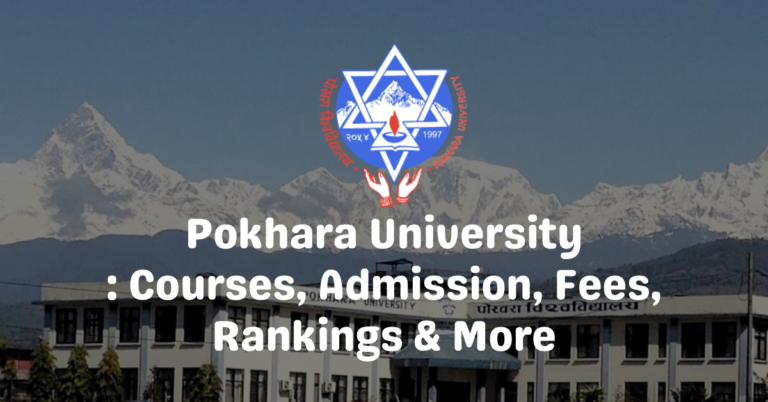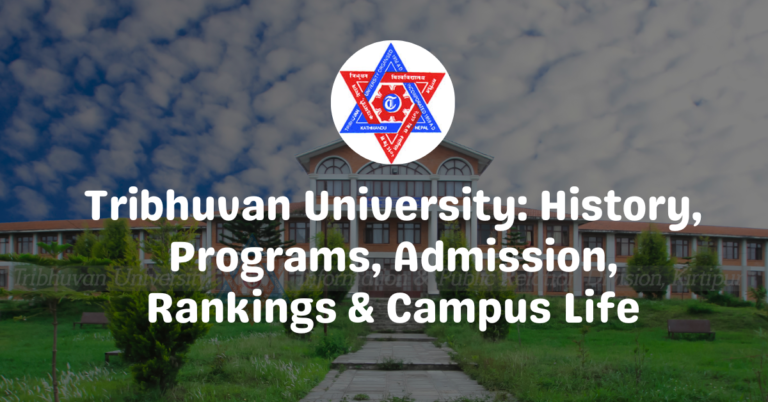Purbanchal University – A Complete Guide to Nepal’s Emerging Academic Powerhouse
Introduction to Purbanchal University


Purbanchal University (PU), one of Nepal’s prominent public universities, is quickly rising to academic excellence and regional prominence. Founded with a vision to decentralize education and empower eastern Nepal, PU today symbolizes a blend of tradition, innovation, and inclusivity. Whether you’re a high school graduate eyeing a career in engineering or a researcher seeking advanced opportunities in health sciences, PU’s expansive academic umbrella has something tailored for everyone.
Nestled in Biratnagar, Morang District—Nepal’s vibrant industrial and cultural hub—PU is not just a place of learning but a center of transformation. With an array of undergraduate, postgraduate, and doctoral programs, the university stands tall among the educational giants in Nepal, providing quality education at an affordable cost.
But PU is more than just academics. Its sprawling campus, tech-integrated infrastructure, career-focused learning, and student-centered culture make it a nurturing ground for tomorrow’s professionals. The University is also known for its strong network of affiliated colleges across Nepal, which makes higher education accessible even in remote corners of the country.
In this comprehensive guide, we will dive into every aspect of Purbanchal University—from its faculties and programs to admission guidelines, scholarships, campus life, and future goals. If you’re planning your academic future, this article is your roadmap to one of Nepal’s most respected educational institutions.
History and Background of Purbanchal University
Founding Vision and Mission
Purbanchal University was established in 1993 under the Purbanchal University Act passed by the Parliament of Nepal. Its founding vision was simple but profound: decentralize higher education and make it more accessible to students outside the Kathmandu Valley. This mission resonates throughout the University’s structure, curriculum, and expansion policies.
From its inception, PU aimed to fill educational voids in science, technology, and health disciplines. Its commitment to inclusive education is demonstrated in its policies for gender equity, rural representation, and financial accessibility. As a result, PU quickly became a sought-after institution for students from all walks of life, especially those from eastern Nepal.
Over the years, PU has continually refined its academic and operational model to align with international standards. By integrating practical skills with theoretical knowledge, PU has maintained a reputation for producing graduates who are not only job-ready but also socially responsible.
Geographical Location and Campus Overview
Purbanchal University’s main campus is located in Gothgaun, Morang, about 15 kilometers from Biratnagar city. The campus spans several acres and features well-planned academic buildings, administrative offices, and residential facilities. It’s a peaceful environment, away from urban chaos, yet well connected through road and communication infrastructure.
The University’s strategic location in eastern Nepal positions it as a bridge between traditional knowledge systems and modern global standards. With its own teaching hospital, research centers, and innovation hubs, the university is not only a knowledge center but also a driver of regional development.
Academic Structure and Faculties
List of Faculties and Departments
Purbanchal University boasts a diverse academic structure spread across 6 major faculties, each encompassing multiple departments and programs. Here’s a breakdown:
- Faculty of Management – Offers BBA, MBA, and MPhil programs focused on entrepreneurship, finance, and HR.
- Faculty of Science and Technology – Includes engineering, IT, and environmental science programs.
- Faculty of Medical and Allied Sciences – Known for BPH, BSc Nursing, MBBS, and other paramedical courses.
- Faculty of Education – Provides teacher training programs and degrees in educational science.
- Faculty of Arts and Humanities – Includes degrees in sociology, journalism, and rural development.
- Faculty of Law – A relatively new but rapidly growing faculty offering integrated law programs.
Each faculty is governed by a Dean, with departmental heads ensuring academic consistency. The curricula are reviewed regularly to ensure relevance in today’s job market, incorporating both local context and global perspectives.
Centers and Research Institutes
PU has established specialized centers like:
- Center for Innovation and Entrepreneurship Development (CIED)
- PU Research and Publication Unit
- Teaching Hospital and Medical Research Center
These centers foster interdisciplinary research, skill development, and industry-academic collaboration. Faculty members are encouraged to publish in peer-reviewed journals and participate in international conferences. PU’s research ecosystem is steadily growing, supported by national and international grants.
Courses Offered by Purbanchal University
Undergraduate Programs
Purbanchal University offers a broad array of undergraduate programs across all faculties, designed to equip students with both core knowledge and marketable skills. Here are some flagship programs:
- Engineering: BE Civil, BE Computer, BE Electronics
- Management: BBA, BBM, BHM (Hotel Management)
- Health Sciences: BSc Nursing, BPH, BMLT, B Pharma
- Education: BEd in English, Science, and Mathematics
- IT: BSc CSIT, Bachelor in Information Technology
What sets PU apart is the hands-on approach to learning. Students undertake internships, field visits, and projects as part of their academic curriculum, ensuring they graduate with real-world exposure.
Postgraduate and Doctoral Programs
PU has been steadily expanding its postgraduate and doctoral offerings, aligning them with global research and industry trends. Popular postgraduate degrees include:
- MBA and EMBA
- MPH (Public Health)
- MSc in Environmental Science and Biotechnology
- MEd and MPhil in Education
Doctoral research is also encouraged, particularly in health sciences, engineering, and management. PU’s growing reputation as a research-driven institution is evident in the increasing number of PhD candidates and research publications each year.
Admission Process and Requirements
Eligibility Criteria for Domestic Students
For undergraduate courses, students must have completed their +2 level or equivalent with minimum GPA/marks depending on the faculty. For instance:
- Engineering: At least a “C” grade in Physics, Chemistry, and Mathematics
- Health Sciences: +2 Science with Biology; entrance exams mandatory
- Management: Minimum 2.0 GPA or second division
Most faculties conduct entrance exams and/or interviews. Applications are generally open from June to August every year.
Admission Guidelines for International Students
International applicants are warmly welcomed at PU. Here’s how they can apply:
- Submit an online application form with educational documents
- Provide a statement of purpose (SOP)
- Appear for online interviews or entrance tests (if applicable)
- Show proof of English language proficiency (IELTS/TOEFL preferred)
PU also offers visa support letters, hostel accommodations, and orientation sessions for international students, ensuring a smooth transition into the academic and cultural environment.
Affiliated Colleges under Purbanchal University
Top PU Affiliated Colleges by Faculty
Purbanchal University operates through a robust network of affiliated colleges that span across various regions of Nepal. These colleges deliver academic programs under the guidance and curriculum of the University, ensuring consistency and quality education. Here are some of the most reputed PU-affiliated colleges categorized by faculty:
- Management:
- Apex College, Kathmandu
- Nobel College, Sinamangal
- Kantipur College of Management and IT (KCMIT)
- Science and Technology:
- Kantipur Engineering College
- Aryan School of Engineering
- Kathmandu Model College of Technology
- Health Sciences:
- Nobel Medical College, Biratnagar
- National Academy for Medical Sciences
- Universal College of Medical Sciences
- Education:
- Hetauda School of Education
- Mahendra Multiple Campus
- Law and Humanities:
- Mid-Valley International College
- British College of Law and Humanities
These institutions uphold PU’s academic standards and also collaborate in research, student exchange, and community outreach. PU regularly audits and evaluates its affiliates to maintain academic integrity and performance.
Regional Distribution of PU Colleges
One of PU’s greatest strengths is its regional reach. While Kathmandu remains a hub for higher education, PU has significantly decentralized its educational infrastructure. Affiliated colleges are spread across:
- Eastern Nepal: Biratnagar, Dharan, Itahari
- Central Region: Hetauda, Chitwan, Bhaktapur
- Western Nepal: Pokhara, Butwal
- Far Western Region: Dhangadhi, Mahendranagar
This geographical spread ensures that students in rural and semi-urban areas have access to higher education without relocating to major cities, a core principle of PU’s founding vision.
Fee Structure and Scholarships
Program-Wise Fee Breakdown
Purbanchal University is known for offering quality education at an affordable price, especially compared to private universities. The tuition fees vary by program and faculty:
| Program | Average Annual Fee (NPR) |
|---|---|
| BBA | 150,000 – 200,000 |
| BE Civil/Computer | 200,000 – 250,000 |
| BSc Nursing | 250,000 – 300,000 |
| MBBS | 800,000 – 1,000,000 |
| MBA | 250,000 – 300,000 |
| MPH/MSc Programs | 200,000 – 250,000 |
These fees include tuition, registration, lab usage, and examination costs. Additional fees may apply for hostels, transportation, and specialized training programs.
Scholarships for Meritorious and Needy Students
PU has established a comprehensive scholarship policy to ensure that no deserving student is denied education due to financial constraints. Scholarships include:
- Merit-Based Scholarships: Awarded to students with high entrance scores or academic distinction in previous studies.
- Need-Based Scholarships: For economically disadvantaged students, based on family income and socio-economic status.
- Reserved Category Scholarships: Offered to marginalized communities, women, and differently-abled students.
- Full Scholarships: Provided for students excelling in national-level entrance exams or sports.
Each year, PU allocates a significant budget towards scholarships. Application forms for scholarships are typically submitted alongside admission applications, and decisions are made before the academic year begins.
Infrastructure and Campus Facilities
Hostel, Library, and Sports Facilities
Purbanchal University’s main campus and its constituent colleges are equipped with infrastructure that supports both academic and personal development.
- Hostels: PU offers safe and comfortable residential facilities for both male and female students. Hostels are supervised, and meals, laundry, and recreational spaces are included.
- Libraries: The central library is well-stocked with textbooks, journals, e-resources, and research papers. Digital libraries and databases like JSTOR and HINARI are accessible to all students.
- Sports Facilities: PU promotes physical wellness through dedicated facilities for football, basketball, volleyball, and athletics. Annual sports meets and inter-college tournaments are a major attraction.
These facilities create a balanced ecosystem where students can focus on their studies while also enjoying a holistic campus life.
Tech and Lab Infrastructure
Modern laboratories and computer centers play a crucial role in PU’s academic design. Each faculty has its own dedicated lab space:
- Engineering Labs: Civil, mechanical, and electronics labs with the latest instruments.
- Medical Labs: Anatomy, pathology, and microbiology labs that meet professional standards.
- IT Labs: High-speed internet, networked systems, and access to programming platforms and databases.
The University has also introduced smart classrooms, biometric attendance, and online portals for assignments, results, and academic tracking. This digital approach has made learning more transparent and efficient.
Online and Distance Learning at Purbanchal University
E-Learning Platforms
Recognizing the evolving landscape of education, PU has embraced digital transformation. During and after the COVID-19 pandemic, the university developed several online learning initiatives, such as:
- PU Online Learning Portal: Offers recorded lectures, real-time classes, quizzes, and downloadable resources.
- Learning Management Systems (LMS): Tools like Moodle and Google Classroom are integrated for coursework and student engagement.
- Video Conferencing Tools: Zoom, MS Teams, and WebEx used for lectures, viva, and counseling.
E-learning has become an integral part of PU’s educational delivery, providing flexibility and expanding access to remote students.
Flexibility and Access
Distance learning at PU doesn’t mean compromised quality. Students can attend classes from any part of Nepal or abroad, especially helpful for working professionals and international learners. Here’s why PU’s distance learning is gaining traction:
- Flexible Schedules: Weekend and evening classes
- Digital Exams: Conducted with security protocols
- 24/7 Learning Access: Recorded materials and e-libraries available anytime
This commitment to digital innovation ensures PU remains competitive and inclusive in a global educational context.
Career Opportunities and Placements
Internship Tie-ups
PU emphasizes practical exposure through internships and field visits. Students from all faculties are encouraged to undertake internships during their final semesters. Notable internship partners include:
- Health Sector: Government hospitals, NGOs like Save the Children, WHO-supported health programs
- IT & Engineering: Tech firms, startups, and telecom companies
- Management: Banks, hospitality industries, and financial institutions
These real-world exposures prepare students to face workplace challenges confidently and network with potential employers.
Alumni Success Stories
Purbanchal University takes pride in its alumni, many of whom are excelling in both national and international arenas. PU graduates are working in:
- Government agencies
- International NGOs and INGOs
- Multinational corporations
- Academia and Research
The PU Alumni Association regularly hosts reunions, webinars, and mentorship programs. These interactions serve as an inspiration for current students and foster a lifelong connection with the university.
National and International Collaborations
MoUs and Exchange Programs
Purbanchal University is progressively expanding its academic influence beyond national borders. With several Memorandums of Understanding (MoUs) signed with renowned international universities, PU is opening doors for global exposure for its students and faculty. Some notable collaborations include:
- MoUs with Indian Universities like Jawaharlal Nehru University (JNU) and Banaras Hindu University (BHU)
- Academic exchanges with institutions in China, Japan, and South Korea
- Research partnerships with European Union universities under Erasmus+ programs
These partnerships facilitate student and faculty exchanges, joint research, and collaborative curriculum development. PU students benefit immensely from semester exchange programs and international internships, which elevate their academic profiles and global employability.
Research and Innovation Collaborations
PU has collaborated with international research councils, NGOs, and development partners to conduct impactful research in areas like public health, climate change, sustainable development, and digital transformation. Its Research and Innovation Council fosters interdisciplinary innovation and encourages patent filings and scholarly publications.
PU’s growing academic reputation ensures it is increasingly viewed as a credible partner in global knowledge production and academic discourse.
Student Life and Extracurricular Activities
Student Clubs and Events
Student life at PU is vibrant and full of opportunities beyond the classroom. Various student-run clubs focus on leadership, entrepreneurship, social work, arts, and technology. Popular clubs include:
- PU Business Club
- PU Debate and Literary Society
- Women in Tech Club
- Cultural Heritage Preservation Group
These clubs host regular workshops, seminars, hackathons, and contests that not only boost student morale but also enrich their soft skills. Events like PU Fest, Science Fair, and Tech Carnival have become annual traditions that attract participation from students across Nepal.
Cultural and Sports Activities
PU believes in the holistic development of its students. Cultural activities such as inter-college dance, music, and drama competitions are encouraged to celebrate Nepal’s diversity. Likewise, sports like cricket, football, volleyball, and athletics are popular and well-supported.
The Annual Sports Meet and Inter-Faculty Cultural Week bring the entire university community together. These events foster teamwork, leadership, and creativity among students, helping them grow into well-rounded individuals.
Rankings and Recognition
National Rankings
Purbanchal University consistently ranks among Nepal’s top public universities, particularly in technical education and health sciences. It is recognized by the University Grants Commission (UGC) of Nepal for academic excellence, infrastructure, and inclusivity. In national evaluations:
- PU is ranked Top 5 for Engineering and Health Sciences
- Its affiliated colleges frequently top board results and graduate success rates
- PU is a leading choice for students from Province No. 1 and Province No. 2
Its robust governance, updated curriculum, and strong academic faculty contribute to its elevated status.
Global Academic Partnerships
Though still growing on the international radar, PU is recognized by several academic bodies worldwide. Its degrees are acknowledged by:
- World Health Organization (WHO) (for health sciences)
- International Association of Universities (IAU)
- Asia-Pacific Quality Network (APQN)
These affiliations enhance the credibility of PU degrees internationally and improve student mobility for further education or jobs abroad.
Challenges and Future Roadmap
Areas for Improvement
Despite its numerous achievements, Purbanchal University faces certain challenges that it is actively addressing:
- Infrastructure expansion is necessary to meet the growing demand for higher education
- Faculty development remains a focus, with initiatives for international training and workshops
- Digital transformation needs consistent investment to ensure all courses are tech-integrated
- Research funding and publication frequency are areas where PU aims to scale up
Transparency in administration, faster results processing, and greater autonomy for affiliated colleges are also among the identified areas for development.
Strategic Vision 2030
PU’s long-term roadmap is outlined in its Strategic Vision 2030, which includes:
- Becoming a fully digital university with online certifications and global courses
- Establishing new centers of excellence in biotechnology, AI, and renewable energy
- Expanding international partnerships and dual-degree programs
- Creating smart campuses across all provinces
- Launching global research hubs with funding from UN, World Bank, and other agencies
This vision reaffirms PU’s commitment to being a driver of socio-economic transformation in Nepal and South Asia through inclusive, quality education.
How to Apply and Contact Details
Application Timeline and Procedure
Applying to Purbanchal University is straightforward and digitalized. The typical admission cycle is:
- June – August for Bachelor-level programs
- August – October for Postgraduate programs
Steps to apply:
- Visit the official PU website: https://www.pu.edu.np
- Navigate to the “Admissions” section
- Fill the online application form and upload required documents
- Pay the application fee via online banking or eSewa
- Appear for the entrance examination and/or interview
- Await merit list and admission confirmation
Applicants should keep scanned copies of mark sheets, photographs, and ID proofs ready during the application process.
PU Contact and Helpdesk
For assistance and inquiries:
- Purbanchal University Central Office
Gothgaun, Morang, Nepal
Phone: +977-21-463701, 463735
Email: info@pu.edu.np
Website: https://www.pu.edu.np
PU also maintains a responsive social media presence on Facebook, Twitter, and LinkedIn, where students can ask questions and get real-time updates.
Conclusion
Purbanchal University is more than just an academic institution—it’s a movement toward equitable, practical, and inclusive education in Nepal. With a strong legacy, affordable tuition, an expanding curriculum, and global aspirations, PU is a beacon of hope for thousands of students each year. Whether you’re a local applicant or an international aspirant, PU offers an academic journey that is not only enriching but also deeply empowering.
With visionary goals and a commitment to quality, Purbanchal University is poised to become a leading force in South Asian education in the years to come.
FAQs
Q1: Is Purbanchal University recognized internationally?
Yes, PU is recognized by academic bodies such as WHO, IAU, and APQN. Its degrees are valid for further studies and jobs abroad.
Q2: How many colleges are affiliated with PU?
There are over 100 colleges affiliated with Purbanchal University across Nepal, offering a wide range of disciplines.
Q3: What are the top courses at PU?
Engineering, Health Sciences, MBA, BBA, Nursing, and IT programs are among the most popular and respected courses.
Q4: How can I apply to PU from abroad?
International students can apply online through PU’s official website. They must submit educational transcripts, SOPs, and proof of English proficiency.
Q5: Does PU offer scholarships to international students?
Yes, PU offers scholarships based on merit and need for both domestic and international students.







